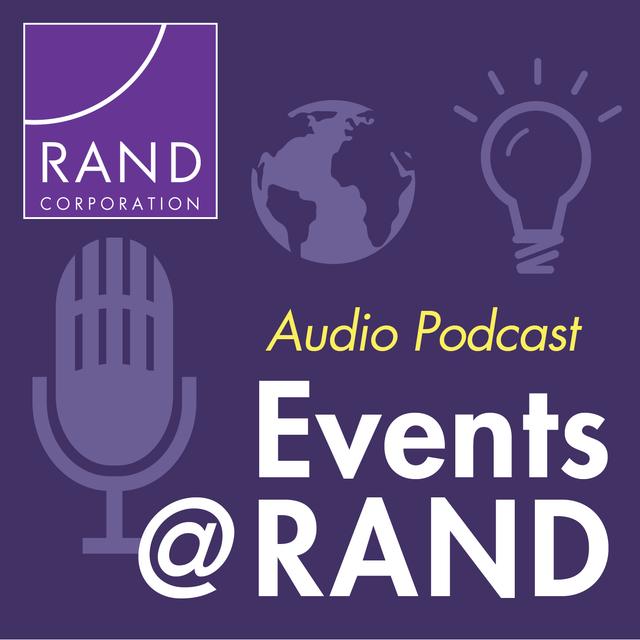Drones
In September 2013, Ted Harshberger, director of RAND Project AIR FORCE, moderated a panel discussion on current military and nonmilitary use of drones and other potential applications.


In September 2013, Ted Harshberger, director of RAND Project AIR FORCE, moderated a panel discussion on current military and nonmilitary use of drones and other potential applications.
Listen in on this panel discussion featuring sociologist Chloe E. Bird on women's health, heart health, gender-based disparities in health care, and the need for gender-specific approaches to diagnosis and treatment.
Middle East analyst Jeffrey Martini discusses the so-called "Arab Spring" countries and how the regional turmoil affects U.S. strategic interests.
Energy expert Keith Crane discusses shifts in U.S. energy markets, their economic implications and effects on gasoline and electricity prices, and how these developments might affect climate change.
Karl Lorenz, a professor at the Pardee RAND Graduate School, discusses how to improve palliative care training for health practitioners and better engage patients in the health care decisionmaking process.
James Q. Wilson left an indelible mark on American government and civil society. In this January 2013 panel discussion at the RAND Corporation, participants who knew Wilson discuss his legacy.
In a conversation with former Northrop Grumman CEO Kent Kresa, Brown shares stories from his new book, Star-Spangled Security: Applying Lessons Learned over Six Decades Safeguarding America.
At RAND's recent Politics Aside 2012 event, Ambassador Charles Ries, Vice President, RAND International, talks with Karen Elliott House, Alireza Nader, and David Rohde about what we can expect for the Middle East in 2013.
Senior defense analyst Bruce Bennett discusses why North Korea presents uniquely difficult challenges and suggests new and creative approaches to deterrence.
V. Darleen Opfer discusses what we know about how today's students learn and how to prepare them for work, citizenship, and life.
Ian Coulter and other experts in complementary and alternative medicine (CAM) discuss patient use of CAM and how hospitals, universities, and the U.S. military are integrating CAM into traditional medical practices.
On June 19, 2012, Alireza Nader, a senior international policy analyst and Iran expert at RAND, discussed Iran's internal political dynamics and U.S. economic, political, and military options in preventing a nuclear-armed Iran.
Philip Taubman illuminates our vulnerability in the face of the pressing terrorist threat—and the unlikely efforts of five key Cold War players to eliminate the nuclear arsenal they helped create.
The 2012 Haskins Lecture was given by National Science Foundation Director Subra Suresh. The lectureship was established through the generosity of Caryl P. and Edna Haskins, founders of Haskins Laboratories, who were dedicated to improving the nation's understanding of the relationship between scientific progress and sound public policy.
California Chief Justice Cantil-Sakauye shares her insights on technologies that have been shown to improve efficiencies in the judicial system, funding the judicial branch in an era of extreme budget cuts, civics education, and diversity on the bench.
Jack Riley discusses how Mexican security issues affect the United States, implications for border concerns such as illegal immigration and drug trafficking, and various policy options available to aid the Mexican government in improving security.
At this March 2012 program, physical scientist Tom LaTourrette discusses the pros and cons of nuclear energy, and sheds some light on lessons learned in the year since Japan's nuclear disaster in Fukushima.
At this January 2012 Policy Forum, experts discuss the public health implications of a U.S. Supreme Court order to reduce the prison population by more than 30,000.
On May 14, 2009, Titus Galama discussed the reality of U.S. competitiveness in science and technology and whether gains by China, India, and other nations are affecting America's chances of remaining a scientific leader.
At this November 2011 Policy Forum, Jonathan Schleifer, policy director for Iraq Afghanistan Veterans of America, joined RAND's Terry Schell for a discussion about the challenges faced by and experiences of recent combat veterans.
David Groves discusses an innovative approach to dealing with the many challenges that may contribute to sustainable and affordable solutions of long term water supplies in California.
RAND recently assessed accountability systems in five public secvice sectors (child care, education, health care, public health emergency preparedness, and transportation) and made recommendations on how to improve them.
At this program, Brian Michael Jenkins explored some of the most significant political, fiscal, social, cultural, psychological, and military implications of U.S. policymaking since 9/11.
Madeline Di Nonno, executive director for the Geena Davis Institute on Gender in Media, and Rebecca Collins discuss how media images of girls influence how they see themselves and whether portrayals of sex in popular media influence behavior.
Los Angeles Police Chief Bill Bratton joins Greg Ridgeway, director of the RAND Safety and Justice Program, in this dialogue about the effect of mounting constraints on city and state resources and the state of public safety in Los Angeles and California.
Economist Krishna B. Kumar discusses India's impact on the global economy and the implications of India's economic rise for the United States.
On July 26, 2011, RAND experts discussed the military, political, fiscal, social, cultural, psychological, and moral implications of U.S. policymaking since the 9/11 terrorist attacks.
At this June 2011 RAND Policy Circle event in Pittsburgh, a selection of RAND's top experts in education policy shared fresh, evidence-based perspectives on measuring school performance.
On June 16, 2011, RAND senior political scientist Seth Jones, an expert on Afghanistan, Pakistan, and al Qa'ida who has worked abroad in conflict zones over the last several years, presented "After bin Laden: The United States, Afghanistan, and Pakistan.
On February 17, 2011, the RAND Corporation presented "A Conversation with John Deasy, the Next Superintendent of LAUSD" as part of its Distinguished Speaker series in Santa Monica, California.